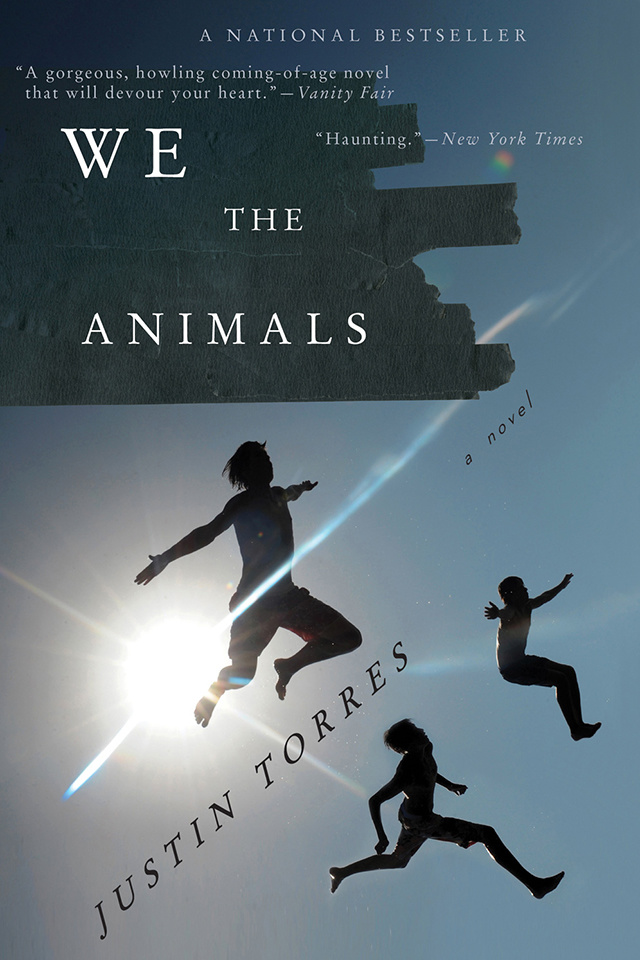Justin Torres had rich, personal material to draw from for good fiction. He grew up the youngest of three boys in a mixed-race family struggling with economic hardship and violence. But during what he describes as a “chaotic childhood,” he didn’t give much thought to a career—let alone one as a writer.
The Iowa Writers’ Workshop at the University of Iowa helped change that. Although he loved to read, Torres says he came to writing late. After taking a writing class on a whim in his late 20s, he began crafting fictional stories based on his life and discovered what he wanted to do: write.
Screenings of the film We the Animals, based on the 2011 book by University of Iowa graduate Justin Torres, begin at FilmScene on Sept. 28.
“About that time, I found out about the University of Iowa,” says Torres, who was raised in Upstate New York. “I think I was one of the few people who had never heard of the Iowa Writers’ Workshop. I didn’t know there were MFA programs. I didn’t know that there were places that would give you money to write. But when I heard about Iowa, I said, ‘I’m going.’”
Torres had drafted much of his semiautobiographical debut novel We the Animals before arriving on the UI campus, but he didn’t know what it could become. Lan Samantha Chang, director of the Iowa Writers’ Workshop, recalls how Torres’s application stood out.

“We receive so many applicants every admissions season and encounter so many profoundly gifted writers, but it is a truly rare experience to come across work that already feels iconic,” Chang says. “From the first line of the first story, all of us reading for admissions knew that we were encountering a voice so real and incorruptible as to be unforgettable.”
We the Animals was published by Houghton Mifflin Harcourt in 2011, a year after Torres received an MFA from Iowa. The book was nominated for a Publishing Triangle Award and an NAACP Image Award and won an Indies Choice Award. A film adaption premiered at the 2018 Sundance Film Festival, taking home a NEXT Innovator Prize.
Torres returned to campus in September as the inaugural reader for Sandra Cisneros Day, an Iowa Writers’ Workshop celebration that honors the UI alumna and award-winning author of The House on Mango Street with a reading by a Latinx writer. Torres spoke about his experience in the workshop and what it was like to work on the film adaptation of his novel.
How did your time in the workshop influence We the Animals?
I got to study with people like Marilynne Robinson, Lan Samantha Chang, Edward Carey, and Allan Gurganus—all amazing, incredible writers whom I really admire—and the insights they had affected the book quite a bit. Also, the faculty modeled literary citizenship in a way that was wonderful. For example, I was in a seminar with Paul Harding when his book Tinkers won the Pulitzer Prize. He didn’t cancel class. He had just won the Pulitzer and he came to class. We popped a bottle of champagne, and he taught.
It was at Iowa that I first thought about “What is a book?” and “What is required for something to be called a novel?” and “What are the important distinctions between fiction and poetry and poetic prose and all other types of writing?” I got a real literary education. You put a lot of writers together and you start to have amazing conversations. I had to defend my tastes for the first time. I loved being around people who were not only readers, like I was, but also fans of literature.
You have said that you write “to break your own heart.” What does that mean?
I think now more than ever we protect ourselves from the world. We protect our hearts from the struggles and disappointments of being alive. When I say “to break my own heart,” I don’t just mean sorrow and despair. I mean break open. The act of writing forces you back into this place of being open and receptive to the world, and some pain is going to come in. But a lot of other things are going to come in as well when you’re really paying attention to what it’s like to be alive. There’s something about breaking open that which defends us from the world that seems important. I do write to break my own heart. I think that’s the way I know I’m onto something good.
What do you want readers take away from your writing?
My main themes are race, class, and sexuality—those are things I think a lot about. This book is about a family that is struggling in very concrete and real ways with abstract concepts like economic pressures and societal pressures. I want people to think about the connection between the social and political world we live in and the human lives we live every day. I also want peoples’ hearts to be broken, for sure. I love it when people tell me that they cried reading my book. I think that fiction is a really great place to explore trouble and violence and hurt and heartbreak, so that you don’t have to do it all the time in the real world.
How did the movie adaptation of We the Animals come about?
I had a few offers from people in Hollywood, but nobody was speaking about the book in a way that spoke to me, in a way that I thought was worthwhile. Then director Jeremiah Zagar came along, and we really connected. He “got” the book: he read it, he understood it, he loved it. He made a documentary called In a Dream, which was fantastic, and once I saw it, I knew the film was going to be a work of art. It has outperformed everybody’s expectations, been reviewed really well, and been held over in theaters. But even if it got panned critically or didn’t do well, I would be happy with it. It’s its own piece that speaks to the book in great ways.
How involved were you in the film production? What surprised you about the process?
I was much more involved than I ever thought I would be. I was there for casting. I was on set when they shot it about half an hour from where I grew up. I was in the editing room. Jeremiah and I had a really great working relationship, and we plan to collaborate again.
I thought that I would want more control, that being a fiction writer meant I didn’t like to collaborate—at least that was my hunch. But I was surprised by how much I love collaboration. It takes so many people to make a film—the cinematographer, the editors, the art director, the crew—and they were all brilliant. On the screen, you see the result of many minds working together to create something, as opposed to when you pick up a book and experience one mind. That was cool.
You are on the English faculty at UCLA. Do you incorporate elements of your Iowa education into your teaching?
In my creative writing workshop, I use the exact Iowa model. There are 12 students in the workshop and they have to apply. It’s selective, and there is much more demand than students I can take, so I get a really great group. The student population at UCLA is very diverse—they are from everywhere, and it’s such a privilege to teach them. I also teach a queer Latino literature course and a course on adapting books to film. I get to decide what I’m going to teach, so I teach my interests and passions. There’s nothing better.
What other projects are on the horizon?
I’m writing another book, and it’s taking time. The second book is really hard. I didn’t expect the success of the first book, and I certainly didn’t expect the film, but I finally feel like We the Animals is done. That long and completely transformative chapter that started right before I came to Iowa is ending now.
